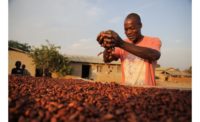
Jeff Morgan, director of global programs for Mars, has worked for the past 32 years helping cocoa growing communities.
When Mars, Inc. received the U.S. Secretary of State’s 2010 Award for Corporate Excellence (ACE), the recognition acknowledged not only the company’s most recent efforts in improving economic development in Ghana’s cocoa-growing region, but indirectly its long-standing commitment to improving cocoa farmers throughout the world via research, training, investment and personal involvement.
The ACE award carries with it a special cachet since it’s an honor for good corporate citizenship that has its origins with American embassies around the world U.S. companies are nominated by chiefs of mission worldwide and the winners are chosen by the Principals’ Award Selection Committee.
The Committee, chaired by the Under Secretary for Economic, Energy, and Agricultural Affairs, includes a representative of the Secretary, the Under Secretary for Global Affairs, the Under Secretary for Public Diplomacy and Public Affairs, and various Assistant Secretaries.
It also includes senior offi cials from the U.S. Agency for International Development, Overseas Private Investment Corporation, MCC, and the Department of Commerce.
In 2010, Mars was one of three winners (Cisco Systems, Israel, and Deniamatric, Guatamala, were the other two) chosen from a record 78 nominations. Donald Teitelbaum, U.S. Ambassador to Ghana, cited Mars Partnership for African Cocoa Communities of Tomorrow (iMPACT) as well as its commitment to cocoa sustainability as critical elements in Mars capturing the ACE award.
In a way, the ACE award simply recognizes founder Forrest Mars’ operating philosophy, one that emphasizes “mutality of benefi ts” for all stakeholders. As Jeff Morgan, director of global programs for Mars, explains, he’s been involved in a broad range of corporate cocoa aid programs for the past 32 years, personally having been in Brazil, West Afrrica and Indonesia promoting best practices.
Noting that Mars has worked with several partners in Ghana and elsewhere, such as the Sustainable Tree Crop Foundation, the Gates Foundation and the World Cocoa Foundation, Morgan emphasizes that the company is focused on taking a more holistic approach to helping communities in cocoagrowing areas.
“During the last 20 years, we’ve gained a signifi cant perspective on cocoa farming,” he says. “The most severe problem is that farmers are often getting only 300 to 350 kilos per hectacre, which is way too low to maintain a sustainable operation.”
He also points out that many other factors come into play, such as the aging of trees, many of which are 20 to 30 years old, proper pruning techniques, issues with pesticides, and the need for soil fertilization. By educating farmers about better cultivation techniques as well as by improving cocoa stocks, farmers can reach 500 to 600 kilos per hectacre.
Morgan believes that 1,000 to 1,200 kilos per hectacre yields are doable. “By better breeding and distribution of better gene types, we can rehabilitate farms,” he says. The mapping of the cocoa genome will go a long way in improving cocoa varieties so that they are disease-resistant, high yielding and fl avorable.
As Morgan points out, it is truly to everyone’s benefi t, from corporation to consumer, from farmer to fi nancier, that cocoa communities reap the benefi ts from this wonderful crop. It’s the one ace that global cocoa community has to play in keeping its industry vibrant.





